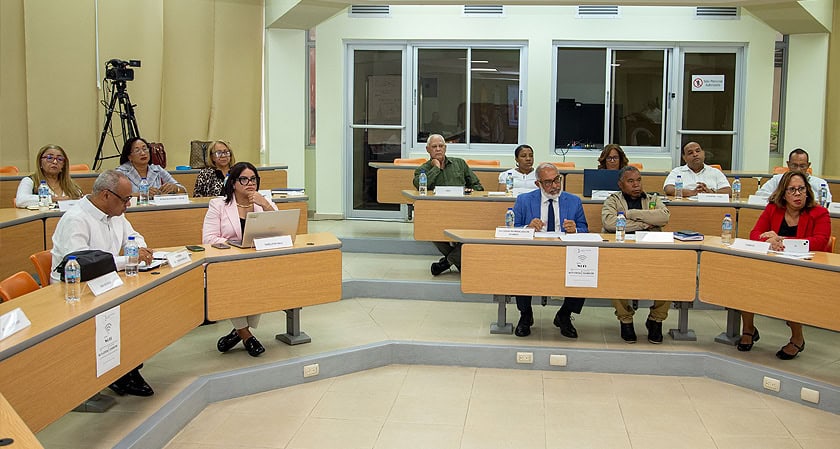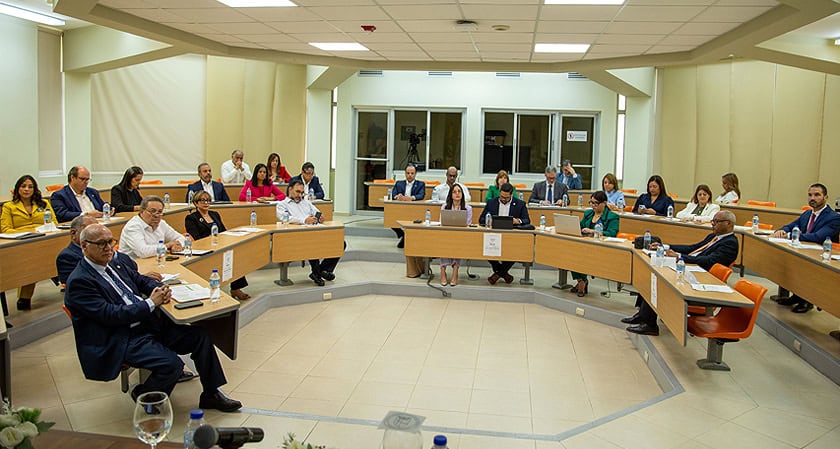Which organizations are leaving the Economic and Social Council (ESC)?

The Economic and Social Council ( CES ) restructured the group of 42 associations and universities that comprise it, resulting in the replacement of 10 of them from their positions as representatives of the labor, social and business sectors .
This organization , created by the Constitution as an advisory body to the Executive Branch, was suggested by former President Danilo Medina to carry out the dialogue on Haitian migration to which he was invited by President Luis Abinader, along with former presidents Hipólito Mejía and Leonel Fernández.
It has also been the forum for discussion of the educational, fiscal, electricity, and water pacts , and the stage for debating the 16 reforms proposed by President Abinader in 2021.
Fulfilling a legal mandate , the CES held its ordinary assemblies for the second time in its 20-year history to renew its membership for the 2025-2029 term.
Six entities in the social sphere were replaced, three in the labor sphere and one in the business sphere.
Social![[object HTMLTextAreaElement]](https://resources.diariolibre.com/images/2025/05/09/038-asamblea-eleccionaria-sector-social-28-abril-2025-68f51cf4.jpg)
In the cooperative sector, the Institute for the Development of the Associative Economy (IDEAC) left and the Foundation for the Development of the Social Economy (Aseprocat) entered.
In the environment and sustainable development category , Guakía Ambiente was excluded and the National Observatory for Consumer Protection (Onpeco) was added.
Rural residents will no longer be represented by the National Peasant Articulation (ANC), but by the National Confederation of Rural Women (CONAMUCA).
The Francina Hungría Foundation will replace the Dominican National Federation of Disabled Persons (Fenadid) to represent the population with special abilities .
The Citizen Forum won the diverse groups position that previously belonged to Alianza ONG. Similarly, the Solidarity Foundation defeated the Juan XXIII Center in the institutionality, transparency, and rule of law segment.
The Committee for the Defense of Neighborhood Rights (Copadeba), the Santo Domingo Institute of Technology (Intec), Ciudad Alternativa, the Center for Research on Women's Action (Cipaf), and the Santo Domingo Economic and Social Development Council (Codessd) maintained their presence.
Other entities are eligible for a permanent position. These include the Autonomous University of Santo Domingo (UASD), the Dominican Association of University Rectors (ADRU), the Dominican Episcopal Conference (CED), and the Dominican Confederation of Evangelical Unity (CODUE).
Labor
During the new period, the Dominican College of Engineers, Architects, and Surveyors (Codia), the National Association of Dominican Economists (ANED), and the Inter - Union Committee of Working Women (Cimtra) will no longer participate in the discussion table on behalf of the workers.
These spaces will be filled by the National Association of Education Professionals and Technicians (Anproted), the Dominican College of Economists (Codeco), and the Dominican Association of Teachers (ADP), which previously participated through the Autonomous Confederation of Class-Based Trade Unions (CASC).
The National Union of Nursing Services (Unased), the National Federation of Construction, Wood and Materials Industry Workers (Fenticommc), the National Federation of Free Trade Zone Workers (Fenatrazona), the National Confederation of Transportation Organizations (Conatra), the National Federation of Hotel, Bar and Restaurant Workers (Fenatrahorets) and the Dominican Society of Newspapers (SDD) were re-elected.
The National Confederation of Trade Union Unity (CNUS), the Autonomous Confederation of Class-Based Trade Unions (CASC), and the National Confederation of Dominican Workers (CNTD) each retain two permanent seats .
Business
The only business association leaving is the Association of Industrialists of the Northern Region (Airen), which will be replaced by the Association of Industries and Businesses of Haina and the Southern Region (AIE HAINA).
The National Council of Private Enterprise (Conep), the Dominican Federation of Chambers of Commerce (Fedocamaras), the Dominican Confederation of Small and Medium-Sized Enterprises (Codopyme), the Association of Industries of the Dominican Republic (AIRD), the Dominican Association of Free Trade Zones (Adozona), the Association of Hotels and Tourism of the Dominican Republic (Asonahores), and the Dominican Agribusiness Board (JAD) were re-elected.
Additionally, the National Organization of Commercial Enterprises (ONEC), the Association of Home Builders and Developers (Acoprovi), the Association of Multiple Banks of the Dominican Republic (ABA), the Dominican Association of the Electrical Industry (ADIE), the Employers' Confederation of the Dominican Republic (Copardom), the Mining and Petroleum Chamber of the Dominican Republic (Camipe), and the Dominican Association of Exporters (Adoexpo) participated.
The business sector is not entitled to any permanent members.
Election processThe CES announced in a press release that it reviewed the documentation of 100 organizations that expressed interest and that the elections were held in three electoral assemblies : on April 28 for the social sector, on April 30 for the business sector , and on May 7 for the labor sector.
Rafael Toribio, president of the CES , said that the hope and need is for " organizations with a greater commitment to participation and social responsibility for institutional strengthening to be elected."
- The CES is made up of 15 organizations from each sector: business , labor, and social . This adds up to 45 members, but the actual number is 42 because three of them hold two positions.
Of the 42, seven are explicitly named in Regulation 291-20 and occupy fixed seats , 25 were re-elected and 10 new ones will be added.
Three sectoral meetings coordinated by Ms. Ana Selman, Secretary General of the CES , are planned for the coming days.
Also pending are the appointment of representatives from each entity , the swearing-in of the board members , the election of the Executive Committee , and the formation of the five permanent working committees of the CES : Institutionality, Transparency and the Rule of Law; Education, Health and Social Protection; Economy, Productivity and Employment; Environment and Sustainable Development; and Emerging and Current Affairs.
TOPICS -
Diariolibre





